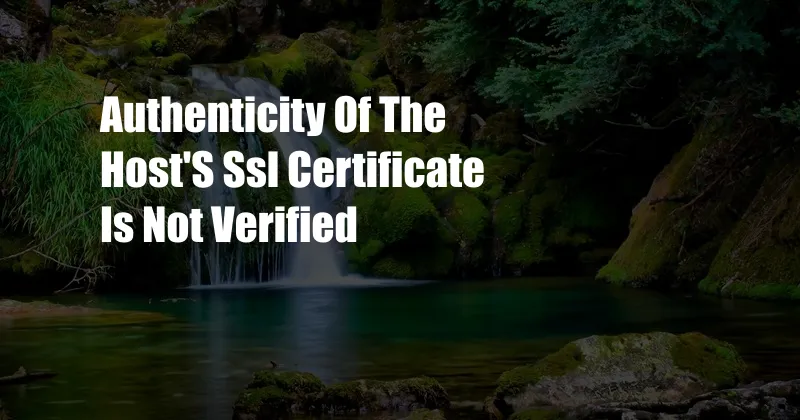
The Authenticity of the Host’s SSL Certificate Is Not Verified
Have you ever encountered a website that displayed a warning message indicating that the authenticity of the host’s SSL certificate could not be verified? This can be a disconcerting experience, especially if you are about to enter sensitive information such as credit card numbers or passwords. But what does this message mean, and more importantly, what should you do about it?
SSL (Secure Sockets Layer) certificates are digital certificates that provide a secure connection between a web server and a browser. When a website has an SSL certificate, it means that the data transmitted between the website and the browser is encrypted, making it very difficult for third parties to intercept and read it. This is essential for protecting sensitive information, such as credit card numbers and passwords.
Understanding the Warning Message
When you see the warning message that the authenticity of the host’s SSL certificate cannot be verified, it means that there is a problem with the SSL certificate. This could be because the certificate is expired, invalid, or not issued by a trusted certificate authority. In some cases, this warning may also be caused by a problem with your browser or your internet connection.
There are a few things you can do to troubleshoot this issue:
- Refresh the page: The problem may be temporary and refreshing the page may resolve it.
- Check your browser settings: Ensure that your browser is up to date and that the security settings are set to accept SSL certificates.
- Contact the website administrator: If you continue to see the warning message, you can contact the website administrator to report the issue.
The Importance of SSL Certificates
SSL certificates are an essential part of securing the web. By encrypting data transmitted between a website and a browser, SSL certificates help to protect sensitive information from being intercepted and stolen.
In addition to protecting sensitive information, SSL certificates also provide a number of other benefits, including:
- Improved search engine rankings: Websites with SSL certificates are given a higher ranking in search results, which can help to increase traffic.
- Increased customer trust: A website with an SSL certificate is more likely to be trusted by visitors, which can lead to increased conversions.
- Peace of mind: Knowing that your website is secure can give you peace of mind and help you to sleep better at night.
Tips for Choosing an SSL Certificate
If you are responsible for choosing an SSL certificate for your website, there are a few things you should keep in mind:
- Choose a reputable certificate authority: There are many different certificate authorities (CAs) that issue SSL certificates. It is important to choose a reputable CA that has a good reputation for security and customer service.
- Select the right type of certificate: There are different types of SSL certificates available, so it is important to choose the right one for your needs.
- Install the certificate correctly: It is important to follow the instructions carefully when installing an SSL certificate.
FAQ on SSL Certificates
Q: What is an SSL certificate?
A: An SSL certificate is a digital certificate that provides a secure connection between a web server and a browser.
Q: Why are SSL certificates important?
A: SSL certificates are important because they encrypt data transmitted between a website and a browser, which helps to protect sensitive information from being intercepted and stolen.
Q: How do I choose an SSL certificate?
A: When choosing an SSL certificate, you should consider the following factors: the reputation of the certificate authority, the type of certificate you need, and the cost of the certificate.
Conclusion
SSL certificates are an essential part of securing the web. By encrypting data transmitted between a website and a browser, SSL certificates help to protect sensitive information from being intercepted and stolen. If you are responsible for choosing an SSL certificate for your website, it is important to do your research and choose a reputable certificate authority. By following these tips, you can help to ensure that your website is secure and that your visitors’ data is protected.
Are you interested in learning more about SSL certificates? If so, I encourage you to do some research on the topic. There are many resources available online that can help you to understand the importance of SSL certificates and how to choose the right one for your website.